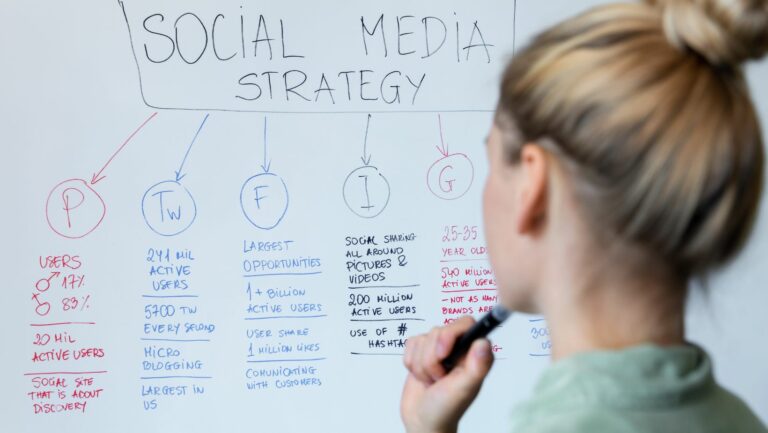
Top B2B Social Media Platforms You Must Use for Business Growth in 2024
In the ever-evolving world of business, social media isn’t just for sharing cat memes and vacation pics. It’s a powerful tool for B2B companies to connect, engage, and grow. But with so many platforms out there, choosing the right one can feel like finding a needle in a haystack—if that needle was also trying to sell you something.
Top B2B Social Media Platforms
B2B social media platforms play a critical role in modern business strategies. These platforms focus on creating professional connections, sharing industry insights, and fostering collaboration among businesses. Key platforms include LinkedIn, Twitter, and Facebook, each offering unique advantages.
LinkedIn serves as the leading platform for B2B engagement. Over 800 million users participate in discussions, share content, and network within various industries. Businesses use LinkedIn for recruiting, brand promotion, and establishing thought leadership. In fact, 52% of B2B marketers consider LinkedIn the most effective social media channel.
Twitter excels in real-time communication and interactions. Businesses leverage Twitter for customer support, industry news, and brand visibility. Approximately 79% of B2B marketers use Twitter to promote content and engage audiences, making it a valuable tool for quick updates and conversations.
Facebook also contributes significantly to B2B interactions, connecting organizations with broader audiences. With over 2.8 billion active users, companies utilize Facebook for community building and advertising. It ranks as a powerful platform for sharing content and generating lead opportunities.
Emerging platforms like Instagram and TikTok attract attention but primarily target B2C audiences. While they offer creative marketing possibilities, their effectiveness in a strictly B2B context remains limited. Businesses considering these platforms should evaluate their target demographics before investing resources.
Overall, selecting the right B2B social media platform demands careful consideration. Each option presents unique features tailored to specific business goals. Organizations are encouraged to assess their audience, content type, and engagement methods to choose the most suitable platform for their needs.
Importance of Social Media in B2B Marketing

Social media plays a critical role in B2B marketing by facilitating connections and engagement. Its influence goes beyond casual interactions, making it an essential tool for growth.
Building Brand Awareness
Building brand awareness through social media enhances visibility among target audiences. Companies can showcase their expertise, share insights, and highlight achievements. Engaging content fosters recognition and establishes credibility within industries. LinkedIn serves as a primary platform, given that 61 million users hold decision-making positions. Regular posting engages prospects and nurtures relationships, inviting potential clients to explore services. Utilizing hashtags and relevant keywords further amplifies reach, allowing brands to connect with broader networks. A consistent social media presence cultivates trust, making potential clients more likely to engage.
Generating Leads
Generating leads via social media offers measurable results for B2B companies. Targeted advertising helps reach specific demographics based on criteria like industry, job title, and location. Dynamic content, such as webinars or case studies, attracts interest and encourages engagement. LinkedIn’s lead generation forms streamline the process, eliminating friction for interested prospects. Companies reporting high engagement rates often see a correlation with increased lead conversion. Sharing customer success stories and testimonials builds credibility, establishing social proof that appeals to potential clients. Effective call-to-action strategies prompt users to take the next step, guiding them through the sales funnel.
Selecting The Right B2B Social Media Platforms
Selecting the right B2B social media platform is crucial for effective engagement. Here are the top platforms tailored for businesses.
LinkedIn stands as the premier platform for B2B connections. With over 800 million users, it serves various purposes, including recruiting, brand promotion, and thought leadership. Companies leverage LinkedIn to share industry insights, connect with potential clients, and build professional networks. Regular content updates enhance visibility and establish industry credibility. Companies should focus on creating engaging posts and utilizing LinkedIn’s advertising solutions to target specific demographics effectively.
Twitter’s real-time communication capabilities make it an exceptional tool for B2B interactions. Organizations utilize it for customer support and rapid content sharing, essential for maintaining industry relevance. Engaging with prospects through timely tweets strengthens relationships. Additionally, businesses can monitor trends and industry conversations, allowing for strategic participation. Utilizing Twitter’s analytics helps measure engagement and refine content strategies to reach desired audiences efficiently.
Facebook may primarily focus on B2C interactions, yet it provides valuable opportunities for B2B engagement. Companies use Facebook to connect with wider audiences and generate leads through targeted ads. Group features foster community building among industry professionals while sharing content increases brand awareness. Utilizing Facebook’s analytics assists organizations in understanding audience behavior and tailoring content accordingly. Businesses should focus on showcasing their brand’s personality to attract attracted followers.
Instagram offers unique opportunities for visual storytelling in B2B marketing. Brands can create engaging visual content that showcases their products or services. Utilizing Instagram Stories fosters consistent interaction with audiences. Companies can also collaborate with industry influencers to reach broader demographics and enhance brand credibility. It’s essential to maintain a cohesive aesthetic and utilize hashtags strategically to increase visibility within niche markets.
YouTube
YouTube serves as an effective platform for B2B companies wishing to share in-depth content. Video tutorials, webinars, and case studies showcase expertise and build trust among potential clients. Businesses can engage audiences through informative content while optimizing videos for search. Regular video posting helps maintain an engaged audience and strengthens brand visibility. Utilizing YouTube’s advertising options can effectively target specific market segments, bolstering engagement rates.
Strategies for Maximizing Engagement
Maximizing engagement on B2B social media platforms demands strategic efforts. Companies should implement focused tactics to connect with their audiences effectively.
Content Creation Tips
Develop high-quality, valuable content to engage the target audience. Engaging blog posts, infographics, and videos resonate well on platforms like LinkedIn and YouTube. Incorporating real case studies showcases expertise and builds trust. Utilizing industry-specific hashtags enhances content discoverability. Regularly posting fresh updates fosters continued interest and interaction. Eye-catching visuals capture attention, increasing the likelihood of shares and comments. Companies might also experiment with different content formats, such as polls and interactive quizzes, to encourage participation. Adapting content to fit each platform’s unique user behavior optimizes reach and engagement.
Target Audience Identification
Identifying the target audience is essential for effective engagement. Segmenting audiences based on demographics, interests, and professional roles improves targeting accuracy. Analyzing user behavior on platforms helps shape content strategies. Utilizing analytics tools provides insights into audience preferences and engagement patterns. Gathering feedback through surveys can help refine audience profiles. Networking with professionals in relevant industries reveals valuable insights about potential clients. Engaging with niche communities fosters deeper connections and promotes brand loyalty. Establishing connections with key decision-makers enhances the likelihood of meaningful interactions and collaborations.
Conclusion
Navigating the landscape of B2B social media platforms is essential for companies aiming to thrive in a competitive market. Each platform offers distinct advantages that can be leveraged for effective engagement and brand growth. By understanding the unique features of LinkedIn, Twitter, Facebook, Instagram, and YouTube, businesses can tailor their strategies to connect with their target audience.
Focusing on quality content and consistent interaction not only builds credibility but also fosters lasting relationships. As companies adapt to the evolving digital environment, embracing these platforms will enhance their visibility and drive meaningful connections within their industry. Prioritizing audience insights and engagement tactics will ultimately pave the way for sustained success in B2B marketing.



